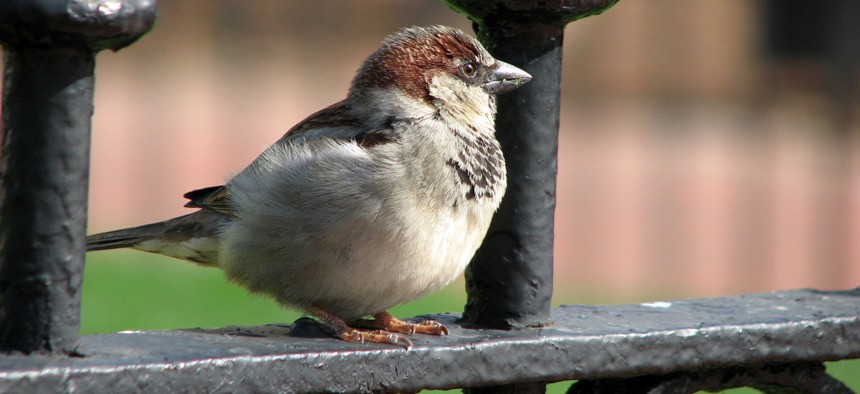Congressman Wants Federal Buildings Outfitted with Bird-Friendly Features

A bird hangs out in Lafayette Park, Washington, DC. Flickr user Jonathon Colman
The Federal Bird-Safe Buildings Act aims to reduce the number of birth deaths resulting from birds flying into federal buildings.
Are the thousands of federal buildings across the country death traps for birds?
An Illinois congressman wants federal buildings to be outfitted with new design materials and even some high-tech features to deter birds from flying to their doom on Uncle Sam’s property.
If approved by Congress, the Federal Bird-Safe Buildings Act would require the General Services Administration to integrate design features that are safer for these winged creatures. The law would only apply to buildings “constructed, substantially altered or acquired” by GSA after the law goes into effect.
Rep. Mike Quigley, D-Ill, introduced the legislation last week.
Nearly 1 billion birds are killed each year by flying into buildings and other manmade structures, according to researchers.
Quigley’s bill would limit the use of glass in lower stories and incorporate netting, screens and window patterns to make sure birds are fully prepared for what lies ahead. Any glass material near areas where birds like to congregate -- such as water or plants -- should be outfitted with similar bird-safety features.
In addition, bird mortality would be monitored at federal buildings.
For existing buildings, the legislation prods building managers to reduce exterior lighting, including through the use of automatic control technologies: timers, photo-sensors and infrared detectors.
There are some notable exceptions to the bird-friendly requirements: the White House, the Capitol, the Supreme Court and all other historic buildings.
The proposal has won praise from conservation and wildlife groups.
“Passing this law is a no-brainer,” said Mike Daulton, vice president of government relations at the Audubon Society, in a statement. “It’s a sensible, simple solution that could help millions of birds avoid grisly deaths by collision.”
The conservation group said the bill would be “cost neutral” -- meaning agencies wouldn’t have to pony up extra spending for the new features.
The measure could also have a positive influence on the country’s economy, according to Quigley.
Migratory birds “help generate billions of dollars annually to the U.S. economy through wildlife watching activities,” he said in a statement.





